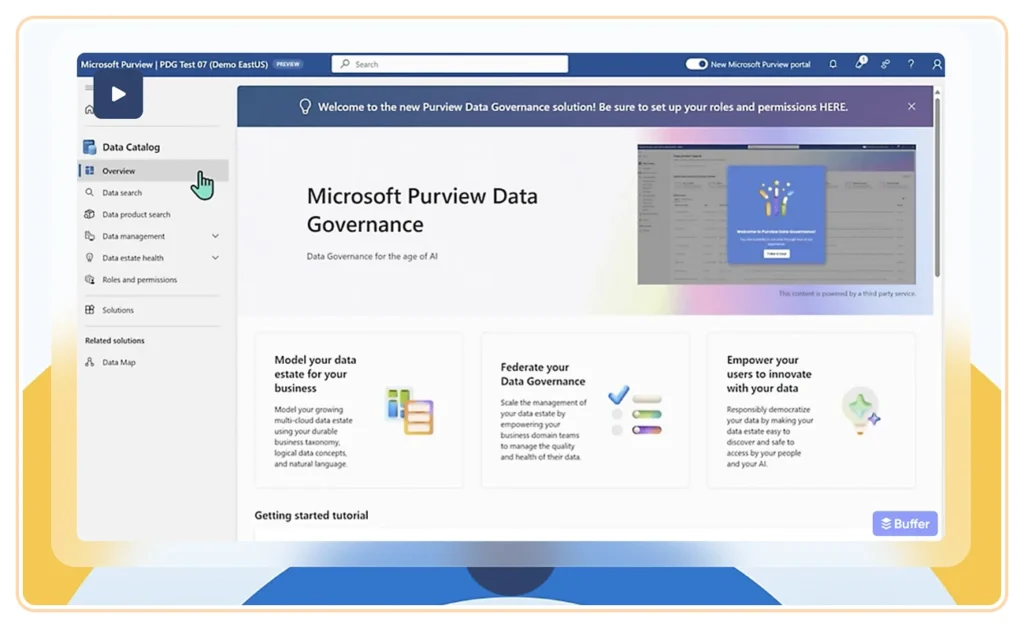Whether you’re setting up your first catalog or reassessing your current data management stack, here are some top data catalog tools on the market. That’s based on dozens of international projects we’ve worked on at Murdio across industries, regulatory environments, and team structures.
What is a data catalog tool, and why is it important?
A data catalog tool helps you find, understand, and trust data across your company. You can think of it as a searchable library for your enterprise datasets – tagged, organized, and enriched with business and technical metadata. A data catalog creates a single source of truth and enables collaboration between business and technical users, who can share a similar understanding of data.
How data catalog tools enhance data governance
Data governance might not be the most glamorous part of data work. But it’s definitely the foundation for everything else: security, compliance, quality, and trust. Data catalog tools give you the governance scaffolding you need by:
- Mapping data lineage (so you know where your data comes from and how it’s transformed)
- Enforcing access controls and policies
- Supporting stewardship with clear roles and responsibilities
- Automating metadata management
- Making compliance documentation easier and auditable
We’ve seen firsthand how a good enterprise data catalog can move governance from a bottleneck to a business enabler. Suddenly, it’s no longer about gatekeeping, but about enabling access to the right data, with the right context.
Key features of a modern data catalog tool
There are multiple data catalog tools available today, depending on the needs of your enterprise. The best ones do much more than index metadata. They make that metadata actionable and valuable across the company.
Here are some key features to look for in 2025:
- Automated metadata harvesting. Modern tools should automatically scan your systems (data lakes, warehouses, BI tools, ETL processes, etc.) to extract and catalog metadata in real time.
- End-to-end data lineage. You should be able to see the journey of your data, from source to dashboard, including every transformation it undergoes. This is critical for impact analysis and compliance.
- Business glossary integration. A shared vocabulary is a pillar of data literacy. Business users need to understand what terms like “customer lifetime value” or “churn rate” actually mean, and how they’re calculated within the company.
- Role-based access and data governance workflows. Built-in governance workflows help review and approve metadata, definitions, and access requests. It’s also important that the workflows align with your governance model.
- AI-driven discovery and classification. With AI assistance, you can surface related datasets, automatically classify sensitive data (like PII), and improve metadata quality without manual tagging.
- Collaboration and knowledge sharing. The best catalogs are interactive: users can leave comments, rate datasets, submit data requests, and even suggest glossary terms.
- Integration with the rest of your data management tools. Your data catalog should integrate seamlessly with your data warehouses (like Snowflake or BigQuery), BI tools (like Tableau or Power BI), and orchestration layers (like Airflow or dbt).
- Active metadata. Metadata should not only describe your data. It should drive actions across your entire stack, from lineage alerts to quality checks.
- Usability and customization. Overall, the data catalog software should allow you to customize it to fit your internal processes, so that people actually find value in using it. It should also allow for integrations with all the other systems your company is using, so that data can flow smoothly across the entire company. (Like in the case of our client, who we helped catalog sensitive data across more than 100 applications.)
Top data catalog tools for enterprise in 2025
We’ve worked with most major data catalog platforms, and while there are different tools for different needs, we definitely consider Collibra as a standout for enterprises prioritizing governance, scalability, and maturity. But let’s take a closer look at it versus other tools that you can also use.
Collibra Data Catalog: Empowering data governance
When clients come to us with complex data landscapes, regulatory requirements, and global scale, we’ll most likely recommend Collibra. It’s much more than a data catalog. Collibra is a full-fledged Data and AI Governance Platform designed for the enterprise. Collibra frees your data from the constraints of silos by unifying data and AI governance across every system and bringing business and technical users into the fold. It gives you a higher degree of compliance paired with more autonomy, so you can accelerate and strengthen every data and AI use case.
Why Collibra stands out
- Comprehensive data governance integration. Collibra is tightly integrated with governance frameworks. Business glossary, data stewardship, policy management, and certification workflows are all native features.
- Strong lineage and impact analysis. From raw ingestion to business dashboards, Collibra lets you trace every data transformation. This is critical in regulated industries like finance and healthcare.
- AI-assisted metadata enrichment. Collibra’s platform uses machine learning to accelerate classification, suggest related assets, and detect data quality issues, automatically.
- Enterprise-grade security and scalability. It’s built for massive organizations, with robust role-based access controls, audit logs, and integration with enterprise identity providers.
- Wide ecosystem integration. Collibra plays well with Snowflake, BigQuery, Tableau, Power BI, SAP, Informatica, AWS, Azure, and any other data source you may have including on-premise sources.
What’s more, the company also recently acquired Raito, further enhancing the platform’s functionality specifically in data access governance, unlocking new possibilities when it comes to end-to-end visibility, traceability, and control. Now, companies can define access once, on the semantic graph, and have it enforced dynamically across platforms like Snowflake, Databricks, Google, AWS, Azure, and more.
At Murdio, we specialize in Collibra implementation and optimization, helping clients roll out the platform across teams, customize workflows, and integrate with their existing data infrastructure. Apart from implementing Collibra, we also help companies make better use of (and ROI from) the Collibra instances they already have in place, but are maybe not using to their fullest potential.
For example, our Collibra technical development team took over an environment of three Collibra instances for a leading DACH retailer, helping significantly improve their functionality and leading to outcomes such as reduced operational costs and improved efficiency. Here’s the full case study.

Other strong data catalog tools to consider
While Collibra sets the standard for governance-focused enterprises, it’s not the only player worth considering. Here’s a breakdown of some of the top alternatives:
Alation
Best for: Collaborative data cultures, self-service analytics
Alation is focused on data democratization, emphasizing usability, search, and team engagement.
Strengths:
- Behavioral analysis to recommend commonly used data assets
- Powerful natural language search
- Collaboration features like annotations, popularity metrics, and usage insights
- Agile integration with BI tools and databases

Informatica Enterprise Data Catalog (EDC)
Best for: Large enterprises already using Informatica for data management
EDC is tightly integrated with Informatica’s broader ecosystem, making it a natural fit if you’re already invested in their data integration, MDM, or data governance tools.
Strengths:
- Enterprise-grade automated scanning and classification
- Deep lineage tracking across hundreds of data sources
- Integration with Informatica Axon for business governance
- AI/ML-powered metadata curation

Informatica Enterprise Data Catalog. Source: www.informatica.com
Microsoft Purview
Best for: Microsoft-centric organizations, Azure-first environments
If your infrastructure lives primarily within Microsoft Azure, Purview is probably worth consideration. It’s not as flexible as some standalone tools, but it’s improving fast and fits perfectly in Azure-native environments.
Strengths:
- Seamless integration with Azure Synapse, Power BI, and Microsoft 365
- Automated data scanning across hybrid sources
- Data sensitivity labeling and access policy enforcement
- Centralized governance experience across data and documents

Google Dataplex
Best for: Organizations operating fully on Google Cloud
Google’s Dataplex provides intelligent data management across GCP, combining cataloging, governance, and quality monitoring into a single platform. For GCP-native organizations, it’s a solid, scalable choice.
Strengths:
- Serverless and fully integrated with GCP services
- Supports centralized governance and fine-grained access control
- Unified management of structured and unstructured data
- Deep integration with BigQuery and Looker
Atlan
Best for: Modern, agile teams with cloud-native stacks
Atlan is one of the newer players. It’s often adopted for its ease of use and flexible APIs.
Strengths:
- “Slack for data teams” UX, collaborative, and intuitive
- Deep integrations with dbt, Snowflake, Airflow, and Looker
- Active metadata support with real-time orchestration
- Git-like versioning for metadata assets
Zeenea
Best for: Organizations looking for fast, scalable, cloud-native cataloging
Zeenea is a newer but fast-growing tool, known for quick onboarding and strong UI, and might be a fit for organizations that want governance without heavyweight implementation.

Strengths:
- Fast time-to-value with prebuilt connectors
- Lightweight and cloud-native
- Metadata automation and flexible business glossary
- Integrates with Snowflake, Databricks, BigQuery, and more
OvalEdge
Best for: Companies looking for end-to-end data governance at a mid-market price
OvalEdge is a data catalog and governance platform that’s feature-rich but still accessible to mid-sized companies. It supports data discovery, lineage, quality, and privacy.
Strengths:
- Data cataloging, governance, quality, and privacy tools in one platform
- Strong lineage tracking and PII discovery
- Affordable licensing model
- Works across cloud and on-prem environments
- Customizable workflows and stewardship tools

Ohalo Data X-Ray
Best for: Privacy-first organizations and compliance-driven data discovery
Ohalo Data X-Ray was built with data privacy, regulatory compliance, and automated discovery in mind. It excels at scanning structured and unstructured data, identifying sensitive information, and maintaining compliance in highly regulated environments.
It’s also a great companion tool for unstructured data that you can use alongside broader data intelligence platforms like Collibra.
Strengths:
- Advanced data discovery across cloud and on-prem storage
- Automatically identifies and classifies PII and sensitive data
- Strong focus on compliance with GDPR, CCPA, HIPAA, and other regulations
- Works across structured and unstructured sources
- Integrates with existing catalog tools like Collibra and governance platforms

Solidatus
Best for: Organizations requiring detailed data lineage and regulatory compliance
Solidatus offers a lineage-first approach to data cataloging, making it a solid choice for enterprises that need to understand and visualize the flow of data across complex systems.
Strengths:
- Advanced data lineage capabilities
- Integrated metadata management
- Compliance reporting for regulatory frameworks
- Collaboration tools for data stakeholders

Ab Initio Metadata Hub
Best for: Large enterprises with high-throughput data systems and strict control requirements
Ab Initio includes a Metadata Hub that functions as a data catalog and governance layer. It’s especially suited for organizations that need custom control and detailed lineage in large-scale environments.
Strengths:
- Deep integration with the Ab Initio processing platform
- Centralized metadata management and active lineage tracking
- High-performance cataloging of massive, complex data estates
- Automation-friendly and extensible for enterprise workflows
We’ve worked with clients who use Ab Initio in tandem with tools like Collibra or Solidatus, where it provides a deeply technical metadata foundation that’s surfaced in more business-facing platforms.
IBM Watson Knowledge Catalog
Best for: Enterprises invested in IBM Cloud or Watson AI stack
IBM Watson Knowledge Catalog is a powerful, enterprise-grade solution designed for secure metadata management and AI readiness. It’s tightly integrated with IBM Cloud Pak for Data.
Strengths:
- AI-powered metadata enrichment and data classification
- Automated data discovery and lineage
- Role-based policy enforcement for sensitive data
- Strong data quality and privacy tools
- Pre-integrated with IBM Watson Studio and DataStage

Data.world
Best for: Data-driven companies focused on collaboration and knowledge sharing
Data.world markets itself as a “knowledge graph-powered data catalog,” and it’s especially effective at blending technical metadata with business context.
Strengths:
- Knowledge graph approach for richer context and relationships
- Excellent search and discovery features
- Open metadata model and strong API support
- Friendly UI for non-technical users
- Built-in governance and policy management

Qlik Catalog
Best for: Organizations using Qlik Sense and looking to streamline trusted data delivery for analytics.
Qlik Catalog is part of Qlik’s larger data integration and analytics ecosystem. While not as feature-rich in governance as Collibra, it shines in operationalizing data, especially in Qlik-native environments.
Strengths:
- Curates and prepares data for analytics at scale
- Built-in data quality, profiling, and enrichment features
- Tight integration with Qlik Sense and Qlik Cloud
- Supports governed self-service analytics with a business-friendly UI
- Streamlines delivery of trusted datasets across departments

Erwin Data Catalog by Quest
Best for: Enterprises with complex metadata landscapes and regulatory requirements
Erwin Data Catalog, now part of Quest Software, offers metadata management capabilities with a strong focus on automated data discovery, lineage mapping, and governance enablement.
Strengths:
- Automated metadata harvesting from databases, ETL tools, BI platforms, and more
- Robust data lineage with drill-down visualization
- Integrated business glossary and semantic mapping
- Support for data governance frameworks and regulatory compliance
- Strong integration with Erwin Data Intelligence Suite

How to choose the right data catalog tool for your organization
While the final choice always depends on your unique context, here are some questions we always ask during the discovery phase when working with our clients:
1. What does your data stack look like?
Does your data live in Azure or Google Cloud? Are you deeply invested in Snowflake, Tableau, dbt? The best catalog is one that integrates natively with your core tools and doesn’t require endless custom connectors to get going. (Though, we can absolutely connect Collibra to any data stack with custom integrations. We’ve done it countless times, and here’s a sample case study.)
2. How mature is your data governance strategy?
If you’re early in your governance journey, you may benefit from a more lightweight, collaborative tool. But if you’re dealing with cross-border data compliance or complex stewardship workflows, Collibra may be a better fit.
3. Who will be using the catalog?
A tool that’s perfect for a data engineering team might fall flat with business analysts or marketers. Look for customizable interfaces and workflows designed for all stakeholders, not just technical users. (And we can absolutely set up custom dashboards for your teams in Collibra.)
4. Do you need active metadata and automation?
If you want your catalog to do things, not just store information, look for platforms that support automation, AI enrichment, and metadata-driven orchestration.
5. What’s your implementation bandwidth?
Some platforms require significant setup and training, while others are more plug-and-play. If you’re short on internal capacity, it’s worth partnering with an implementation team (hi 👋).
At Murdio, we don’t just help you choose the tool, but also make it work and align it with your people, processes, and platforms.
Benefits of implementing a data catalog tool
Done right, a data catalog becomes a robust foundation for your entire data strategy. Some of the key data catalog benefits include:
- Faster data discovery and access. If you get constant questions about “who owns this dataset?” or “where’s the most recent version?”, a data catalog will put an end to them. Everything is searchable, documented, and accessible.
- Improved data quality. With lineage, ownership, and usage monitoring in place, data issues are easier to catch and fix before they impact decisions.
- Stronger compliance and auditability. A data catalog helps you meet GDPR, HIPAA, CCPA, and internal audit requirements with lineage, access logs, and policy management.
- Cross-functional collaboration. Shared definitions, comments, and context help break down silos between business and technical users.
- Increased data literacy. Business glossary and metadata enrichment bring transparency to complex data, making teams more confident and self-sufficient.
- Higher ROI on data investments. A catalog brings visibility and trust to the resources you’ve already invested in.
Challenges in data cataloging and how to overcome them
Even the best data catalog tools won’t deliver results if they’re treated like a checkbox project. We’ve seen a few key challenges come up across industries, and fortunately, we’ve also helped clients move past them.
1. Low user adoption
The issue: Teams don’t engage with the tool, and it ends up underused.
The fix: Involve users early. Customize the catalog to reflect real business needs. Offer training and create a feedback loop. People are more likely to use tools they’ve helped shape.
2. Incomplete or outdated metadata
The issue: Your catalog is only as useful as the metadata it holds. If it’s stale or inconsistent, trust breaks down.
The fix: Automate metadata ingestion wherever possible, and assign ownership for business-critical assets. Use active metadata to keep everything up to date.
3. Lack of governance structure
The issue: Cataloging without governance is just glorified tagging.
The fix: Build clear stewardship roles, approval workflows, and escalation paths into your implementation. This is where platforms like Collibra truly shine.
4. Trying to catalog everything at once
The issue: Big bang rollouts often lead to burnout and missed goals.
The fix: Start small. Focus on high-impact domains. Roll out in phases and celebrate quick wins. We help our clients build roadmaps that grow with them.
PS. For more tips like this, read our guide on data catalog best practices for implementation and maintenance.
Future trends in data cataloging tools
The data catalog of 2025 isn’t just a metadata warehouse. It’s a living, intelligent layer in your data stack. Here’s what’s shaping the next generation of tools:
Active metadata
Your catalog should do more than describe data. It should also drive workflows. Expect to see more tools trigger alerts, update pipelines, and even impact access controls based on metadata events.
Deep AI integration
From semantic search to context-aware recommendations, AI will continue to enrich how we discover and interpret data. Think ChatGPT-meets-your-data-catalog.
Data mesh support
As more organizations move toward decentralized data ownership, catalogs will need to support federated governance, distributed stewardship, and domain-based metadata models.
Unified data experience layers
The catalog will evolve into a central UI for interacting with all things data, connecting not just to your storage layer, but also quality tools, observability platforms, and governance frameworks.
Vertical specialization
Expect more industry-specific catalog extensions, for example, prebuilt glossaries for finance, compliance modules for healthcare, and so on.
At Murdio, we’re keeping a close eye on the latest trends to help our clients build data catalogs meant to easily scale as their companies, data volumes, and ambitions grow.
Find a tool and a team that can help you make the most of it
Choosing a data catalog goes beyond deciding on the software and pricing model (though the latter is definitely an important consideration). It’s a strategic move that can transform how your organization works with data. But what’s also important is finding a team that can tailor the software to your company’s individual needs and your industry.
At Murdio, we can recommend the right tool and assist along the entire process of its implementation: from evaluation and pilot programs to full-scale implementation and long-term adoption.
Talk to one of our certified experts, we’re happy to help!
Frequently asked questions
What is a data catalog tool?
A data catalog tool is a software system that centralizes metadata about your organization’s data assets. Think of it as a searchable, curated inventory of everything from data tables and reports to pipelines and business definitions. It doesn’t just tell you what data you have. It also shows you:
- Where it lives (e.g., in Snowflake, BigQuery, S3, etc.)
- What it means (via business glossary entries and descriptions)
- Who owns it (through stewardship assignments)
- Where it comes from (via lineage mapping)
- How it’s used (through BI integration and usage metrics)
In short, a data catalog connects the dots between your people, processes, and platforms, making your data usable and trustworthy at scale.
What is the best data catalog tool?
The best data catalog tool depends on your company’s size, architecture, and governance maturity. For large, regulated enterprises with complex environments, Collibra is often the best fit. It offers deep governance workflows, extensive integrations, and end-to-end data lineage.
Collibra is also our first choice. We have certified Collibra experts on board and the kind of experience that lets us build any custom integration and solve any data management problem.
In our experience, Collibra stands out across the board with features like a user-friendly, customizable interface, the Guided Stewardship model that helps make much more of Collibra that’s already available out of the box (which is still a lot, actually), and strategic connection with SAP Datasphere, Google Dataplex, and more.
That said, we always recommend starting with a discovery phase to evaluate what your team needs most.
Is Collibra a data catalog?
Yes, but also a lot more than that. Collibra is a Data Intelligence Platform, and its data catalog is one of the most robust in the industry. It combines:
- Data cataloging – Automated metadata harvesting, AI-powered classification, and search
- Data quality – Monitoring, profiling, and validation to make sure data is accurate, complete, and trustworthy
- Data governance – Policy management, stewardship workflows, certification processes
- Data lineage – End-to-end mapping of how data flows across your environmen
- Data marketplace – A hub for sharing, discovering, and requesting data assets across teams
- Business glossary – Shared, structured definitions to promote data literacy
- Collaboration tools – Built-in workflows, comments, ratings, and usage tracking
It’s especially well-suited for enterprises with strict compliance requirements, siloed teams, or a need for centralized governance across multiple business units.
At Murdio, we specialize in Collibra implementation, and we’ve seen how transformative it can be when paired with the right strategy and user engagement plan.
Share this article
Related Articles
See all-

15 November 2025
| Collibra experts for hireWhat is Collibra Edge? A 2025 Explainer
-

15 November 2025
| Collibra experts for hireThe definitive guide to Collibra Data Lineage
-

3 November 2025
| Collibra experts for hireCase Study: Discovering, classifying and cataloging unstructured data for a European bank



